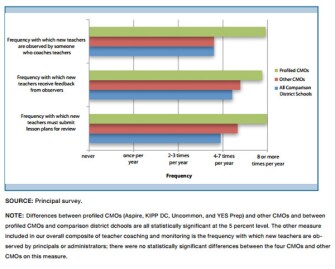The most effective charter school management organizations place a heavy emphasis on coaching teachers—particularly novices—but their approaches to providing that guidance are often quite different.
That’s one of the findings included in a recent study released by the Center on Reinventing Public Education and Mathematica Policy Research, part of a four-year project to gauge which CMO practices have the biggest impact in raising student achievement.
The authors of the study have found that the highest-achieving CMOs place a heavy focus on the coaching of educators, along with setting high expectations for student behavior. (See my colleague Jaclyn Zubrycki’s post last week on the report.)
But it’s also worth nothing that the four CMOs whose coaching strategies are profiled—Aspire Public Schools, KIPP DC, Uncommon Schools, and YES Prep Public Schools—offer different types of coaching, with different levels of intensity, directed by different administrators and educators within the school.
YES Prep uses specialized coaching staff for new educators. KIPP DC has some full-time coaches, but also expects school principals to act as primary coaches. Meanwhile, Uncommon Schools designates some of its teachers to devote a portion of their time to coaching, the authors say.
The charter operators provide “highly individualized support designed to address the unique needs of each teacher, whether new or experienced, struggling or thriving,” the study explains. “Coaching supports for instruction or classroom management can include more frequent observations, highly structured feedback, or review of lesson plans.”
Like many CMOs, the four operators profiled tend to draw a lot of rookie teachers from alternative training programs, like Teach for America. Perhaps not surprisingly, then, the four CMOs place a heavy emphasis on nurturing classroom management skills among new educators.
The charter operators also provide coaching for experienced teachers, which tends to focus on honing instructional practices and aligning them with philosophies of the CMOs in which they work. Charter operators also allow experienced teachers to become coaches, which serves as a route for professional growth.
At Uncommon Schools, teachers’ strengths and weaknesses are assessed at the beginning of the year. Teachers are paired with coaches who have skills aligned with those teachers’ needs; coaches arrange weekly observations of those educators; and teachers take part in summer training sessions focused on classroom management and instructional techniques.
In KIPP DC schools, principals typically visit classrooms each week for short observations, lasting between 10 and 20 minutes. That’s the norm even for experienced educators. Coaches usually follow up these visits by providing comments about the techniques they saw teachers using. Struggling teachers are identified using observations, assessment data, and feedback from students and parents, and are put on improvement plans, and receive more intensive coaching.
The following chart shows the extent to which the CMOs identified as effective observe teachers in action, offer them feedback and review lesson plans, compared with other charters and traditional public schools:




